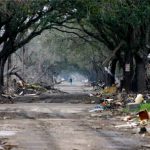With Hurricane Sandy now behind us it is time to start picking up the pieces that were left behind in its destruction. While some of us were fortunate enough to treat this storm as an opportunity to dance in the rain, others were left with damage and despair. In the wake of this, we are reminded of what was quite possibly one of the worst natural disasters this generation has ever seen: Hurricane Katrina.
It was a storm so powerful that its effects were felt worldwide. Many people began to refer to New Orleans as a prime example of irresponsible government. President Bush, Kathleen Blanco – governor of Louisiana at the time-, former mayor of New Orleans, Ray Nagin, and former director of FEMA Michael Brown, were all put under extreme media scrutiny following the disaster. They were blamed for waiting too long to declare states of emergency, lack of aid for evacuations, insufficient planning, and many other things.
In truth, they could have done a better job handling the situation and it is fair to place some of the blame on them. However, knowing what we know about leadership, is it realistic to put all of the blame on a few people? We have discussed time and again in class about all the group roles that exist. No one person makes up all parts of a group. Sadly, the truth is when a group fails, the leader of the group is often blamed for the entire thing. Yes, the leader often does have the final say, but chances are they have carefully considered the input from their group members. So, in reality it is the collective efforts of the group that failed not the single actions of its leader.
Knowing this, my question to all of you is, could you handle the pressure? Could you handle knowing that as a leader if your group fails, you will get blamed? And how would you handle such criticism? Finally, what could be done to help others out there realize that failure does not rest solely on the shoulders of leaders?

November 4th, 2012 at 2:56 pm
Paige, this is exactly what I fear from being in a leadership position: getting blamed for some major downfall. After all, being in charge means being able to take responsibility for everything you (and the people working underneath you) do. However, something I think people fail to realize is that the current leader is not always 100% responsible for events that occur. This point is especially applicable to presidency. Our presidents in the past have all done something to affect the way our country -heck, our WORLD- is now. But they still get blamed for “rollover” from the past. So to answer your question, no, I couldn’t handle that pressure. How can you live with yourself if you think everything IS your fault? That’d be like living with a constant blanket of guilt on your conscience, and I couldn’t healthily handle that.
November 4th, 2012 at 11:55 pm
Paige, good points. I think its important to take into mind when you are choosing to be a leader all the pluses and minuses that come with the job-that may not necessarily be a part of the description. If you’re a leader long enough, you are bound to be a part of failed efforts at some point or another. It’s pretty much unavoidable. It’s important to take that seriously before choosing to become a leader. Leaders ought not to take their roles lightly, they need to be willing to take on and handle the heat when it comes. That’s what separates the good leaders from the bad.